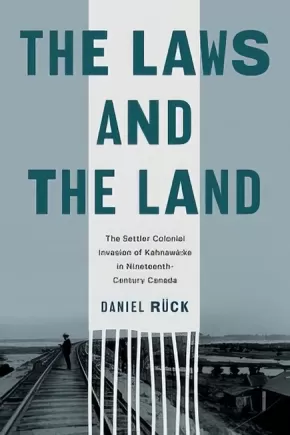Daniel Rück
Daniel Rück is assistant professor of history and Indigenous studies at the University of Ottawa.
Books (1)
Synopsis:
As the settler state of Canada expanded into Indigenous lands, settlers dispossessed Indigenous people and undermined their sovereignty as nations. One site of invasion was Kahnawà:ke, a Kanien’kehá:ka community and part of the Rotinonhsiónni confederacy.
The Laws and the Land delineates the establishment of a settler-colonial relationship from early contact ways of sharing land; land practices under Kahnawà:ke law; the establishment of modern Kahnawà:ke in the context of French imperial claims; intensifying colonial invasions under British rule; and ultimately the Canadian invasion in the guise of the Indian Act, private property, and coercive pressure to assimilate. Daniel Rück reveals increasingly powerful and aggressive colonial governments interfering with the affairs of one of the most populous and influential Indigenous communities in nineteenth-century Canada. What he describes is an invasion spearheaded by bureaucrats, Indian agents, politicians, surveyors, and entrepreneurs. Although these invasions were often chaotic and poorly planned, Rück shows that despite their apparent weaknesses they tended to benefit settlers while becoming sources of oppression for Indigenous peoples who attempted to navigate colonial realities while defending and building their own nations.
This original, meticulously researched book is deeply connected to larger issues of human relations with environments, communal and individual ways of relating to land, legal pluralism, historical racism and inequality, and Indigenous resurgence. It is one story of the "slow violence" of Canada’s legal and environmental conquest of Indigenous peoples and lands, and the persistence of one Indigenous nation in the face of the onslaught.
This book will appeal to legal historians, historical geographers, and scholars of Quebec history, Canadian history, and Indigenous studies.
Reviews
"In this excellent book, Daniel Rück has woven a seamless web of law, history, geography, and Indigenous knowledge, and has made it all look easy." — Philip Girard, professor, Osgoode Hall Law School, York University
"The Laws and the Land is an account of colonial harm. It is an unprecedented look at the dispossession and oppression of the People of Kahnawà:ke by slowly taking their lands away. This book is a must-read for our People but also for all Indigenous peoples who have been dispossessed by the settler governments, churches, and unscrupulous individuals. And it also shows the perseverance and survival of a Mohawk community." — Kenneth Deer, former secretary of the Mohawk Nation at Kahnawà:ke and honorary doctor of laws, Concordia University
Educator Information
Table of Contents
Introduction
1 Kahnawà:ke and Canada: Relationships of Laws and Lands
2 "Whereas the Seigniory of Sault St. Louis Is the Property of the Iroquois Nation": Dissidents, Property, and Power, 1790–1815
3 "Out of the beaten track": Before the Railroad, 1815–50
4 "In What Legal Anarchy Will Questions of Property Soon Find Themselves": The Era of Confederation, 1850–75
5 "The Consequences of This Promiscuous Ownership": Wood and the Indian Act, 1867–1883
6 "Equal to an Ordnance Map of the Old Country": The Walbank Survey, 1880–93
7 "It is Necessary to Follow the Custom of the Reserve Which is Contrary to Law": Rupture and Continuity, 1885–1900
Conclusion
Notes; Bibliography; Index
Additional Information
336 pages | 6.00" x 9.00" | 27 b&w photos, 5 maps | Hardcover






